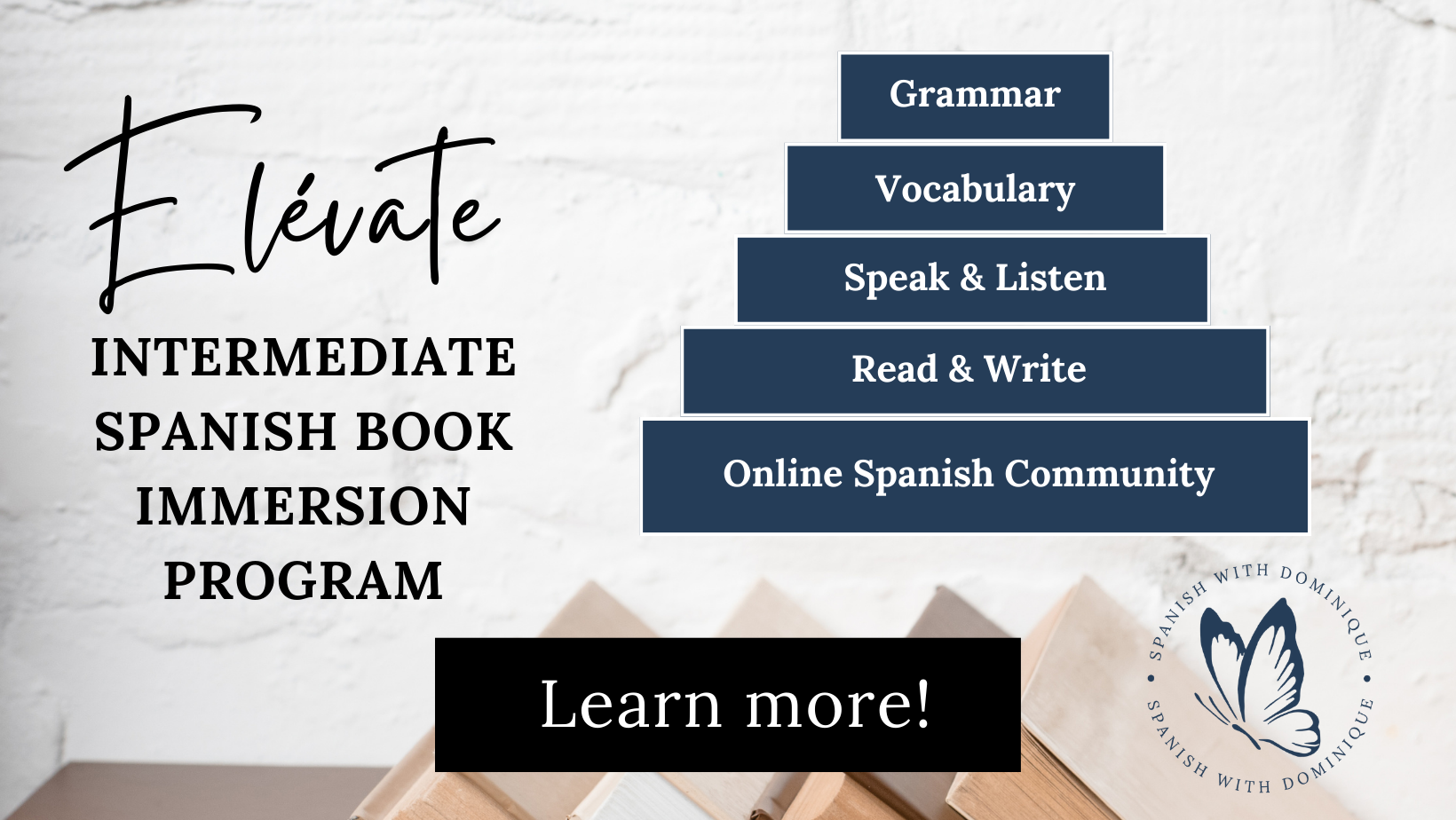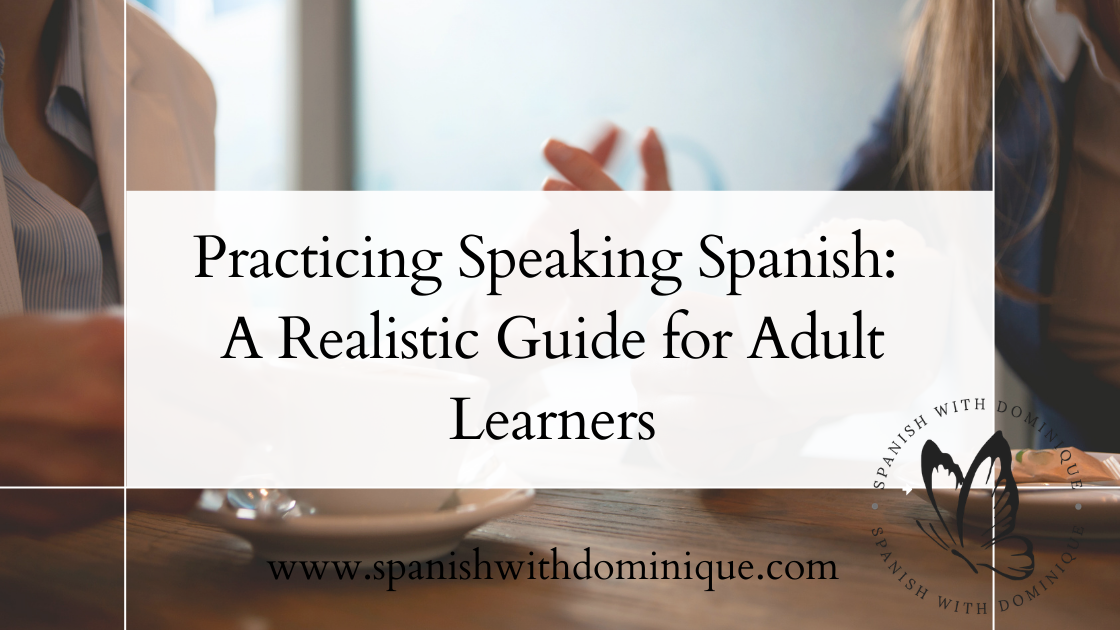5 Strategies to Stay Motivated when Learning Spanish as an Adult
In this post: Five strategies to help you feel motivated and excited about learning Spanish again.
You've put months, years, even decades into learning Spanish, and you’re losing motivation.
You feel like you haven't made enough progress — that you're still grappling with the same confusing grammar concepts.
Feeling frustrated and defeated, you say to yourself, "What's the point!? I'll never get it."
But you still love learning Spanish, and deep in your heart, you don't want to give up.
In today’s post, we are going to tackle this very problem:
How do we continue to show up every day and press forward with learning Spanish when we’ve lost inspiration and are feeling burnout from lack of progress?
While reading this post, consider these questions:
How much of your Spanish learning has been focused on a single abstract goal (aka fluency) instead of celebrating the small wins you are experiencing on your journey?
When was the last time you took a break from your studies or walked away from a difficult topic to clear your head?
When was the last time you had a little fun with your Spanish? (i.e., went salsa dancing, cooked a new dish from a Mexican cookbook, or booked a trip to a Spanish-speaking country)?
What happens when you hit the intermediate plateau
It happens to us all. The dreaded intermediate plateau.
No matter how much you work at it, progress is slow, and things feel hard.
I hit the same roadblock at the intermediate level when I was learning Spanish 10 years ago.
So, why does this happen?
As a beginner in a new language, we immediately enter into the “honeymoon” phase. This is where everything is new and exciting, motivation is high, and progress is fast. We stay in this blissful honeymoon stage until about the low-intermediate B1 level.
At this level, Spanish gets more complicated; progress is slow, and motivation wavers. This is often referred to as the intermediate plateau.
This is when we get frustrated because our expectation is that our learning will continue to be linear. But, the truth is, the learning curve flattens out.
So how do we move past it?
And, more importantly, how do we continue to stay motivated to learn something that we aren’t seeing huge amounts of progress in?
Here are a few strategies to help you stay the course.
#1 Understand that language learning is a process, not an end result
With the way our current culture operates, we are obsessed with the “microwave effect".
You know, the mindset of wanting (and getting) almost everything right now.
You might have even read false advertising in the language learning space with messages like: “Learn Spanish in 90 days … one month! … one week!”
I’m sorry, but they lied to you.
Learning Spanish (and any language that is) is a lifelong journey. Which is why it's so important to enjoy the process and to take small moments to reflect on how far you’ve come.
Even as a Spanish instructor, I am still and will always be a student. On days when I’m feeling extra frustrated, I often sit back and reflect on my journey. I think to myself, “wow, ten years ago, I could barely introduce myself, and now I can hold a full conversation"!
So, right now, think back to last month, six months, a year ago, and reflect on your personal journey. What can you do now that you couldn’t do then?
#2 It’s ok to take a mental break and revisit material later
On days when you’re not on your A-Game with Spanish (i.e., making silly mistakes or stumbling over too many words and feeling yourself getting really frustrated), take a mental break.
Put away your grammar book or short story and go for a walk or focus on something else for a while.
“A while” can be a few hours, a day, a week….basically until you’re ready to refocus with a better attitude.
You see, there is a fine line that we straddle with frustration. It either motivates us to do better, or it can completely overwhelm us and block us from progressing.
When I take a mental break, I sometimes like to say, “Spanish - I am putting you on a time-out right now. I really do love and care about you, but you’re driving me crazy!”
Yes, sometimes I think of my relationship with Spanish as a telenovela with lots of drama and tears, but always ends with love and admiration.
See, this is the difference between being committed to something and waiting to be motivated to do something.
Motivation is fleeting but being committed to something means you come back to it even when things get hardbecause the end reward is so worth it.
#3 Make learning fun again
If you’ve been elbow-deep in workbooks and verb conjugations, and your Spanish studies are feeling a little dull, there is a simple solution to adding variety and fun back into your learning: combine Spanish with topics that already interest you.
This method is called interest-based learning, and there are many benefits to using it.
Start off by thinking of hobbies that already interest you (i.e., sewing, yoga, history, woodworking, guitar, interior design, gardening, painting, etc.)
Then, do these things in Spanish.
For example, my student Melissa loves to get on her Pelton Bike for her morning exercises. She chooses to follow sessions led by the Argentinian instructor so that she’s hearing Spanish while doing her morning ride.
Another student, Emily, is really into gardening and farm-to-fork cooking. She looks for channels on YouTube with cooking demonstrations in Spanish. She also follows a few Instagram accounts that talk about all urban gardens across Latin America &mdash in Spanish, of course.
#4 Remind yourself of your “why”
Why did you jump into learning Spanish in the first place? Was it to travel? To communicate with Spanish speakers in your community? To finally speak Spanish with your Grandma?
Personally, when I’m feeling particularly drained by the language, I go through old pictures and journals of my travels through Spain and Latin America.
I see pictures of the incredible people I met and read about the many adventures I’ve had and the vast knowledge I’ve gained because I was able to speak Spanish.
These memories inspire me to continue on my Spanish journey.
If you’re a visual person, hop on Instagram to follow inspiring pages of your favorite countries or create a vision board on Pinterest.
If you’re more of a social person, find an online Meetup or Facebook group with like-minded people who also love Spanish.
If you’re a reader, grab an inspiring memoir of someone who’s lived in your country of choice.
#5 Set a personal deadline and ask your Spanish teacher to help hold you accountable
When push comes to shove, sometimes we just need a little accountability. Which is why you can solicit the help of a good Spanish teacher to keep you on track.
But make sure that your teacher is not only a good teacher but also a good coach. In other words, make sure that they not only help you conjugate verbs right but that they also inspire you and hold you accountable.
Why? Because so much of learning a language depends on you and your choice to show up every day.
You can liken having a good Spanish Coach to having a good Fitness Coach.
The one hour a week is not going to get you into shape. It’s what you do in-between sessions that will get you to your goal.
And having a fitness coach checking your progress - giving you tips and tools, correcting your form, and celebrating your accomplishments - helps motivate you to stay on track.
The same goes for learning Spanish.
The real progress comes from the work you do outside the classroom - the grammar exercises you do, the podcasts you listen to, the pages in your workbooks that you complete, the short stories you read, etc.
So, when looking for a Spanish Coach, you not only want to find someone who explains new concepts in simple ways, provides high-quality tools and resources, AND corrects your form but also inspires you.
Your key takeaways on how stay motivated when learning Spanish as an adult
Author and speaker, Brené Brown, has spent the last two decades writing about courage, vulnerability, shame, and empathy (I highly recommend both her books and podcasts). She talks a lot about the courage it takes to step into the “arena of vulnerability” when we try new things.
Most people like to sit outside of the arena, passing judgment and criticism. These people will never experience the full joys of life.
On the other hand, those who bravely place both feet in the arena, who take on vulnerability head-on by openly facing challenges and setbacks, feel the empowerment and joy of overcoming adversity.
“Learning Spanish” is stepping into a new arena.
It is a vast, arduous space filled with difficult verb conjugations, confusing sentence structures, embarrassing moments with Spanish speakers, feeling like you’re a 3-year-old when you have a master’s degree and a vast vocabulary in English.
But oh my, I will tell you, on the other side of all of that struggle is a beautiful rainbow full of travel, culture, and experiences that makes it all worth it.
So press onward, my friend! Sí se puede y sí vale la pena.
More Posts Handpicked Just For You!
Enjoyed this post? Here are some more you might like.






